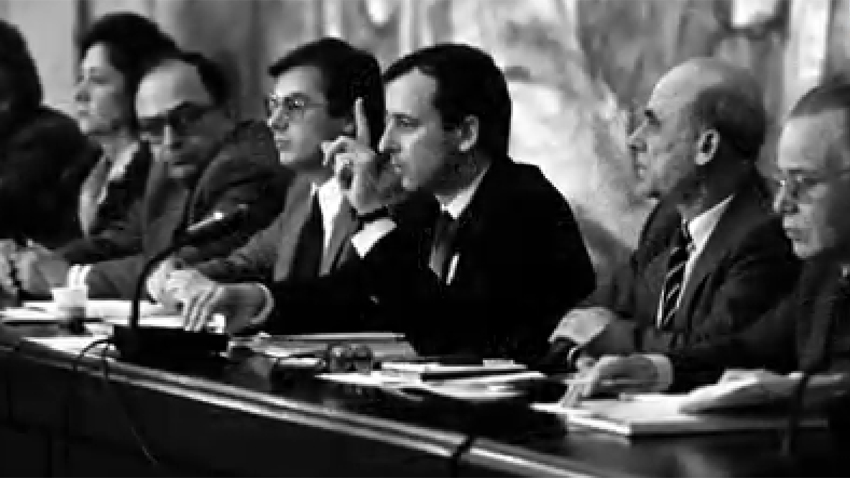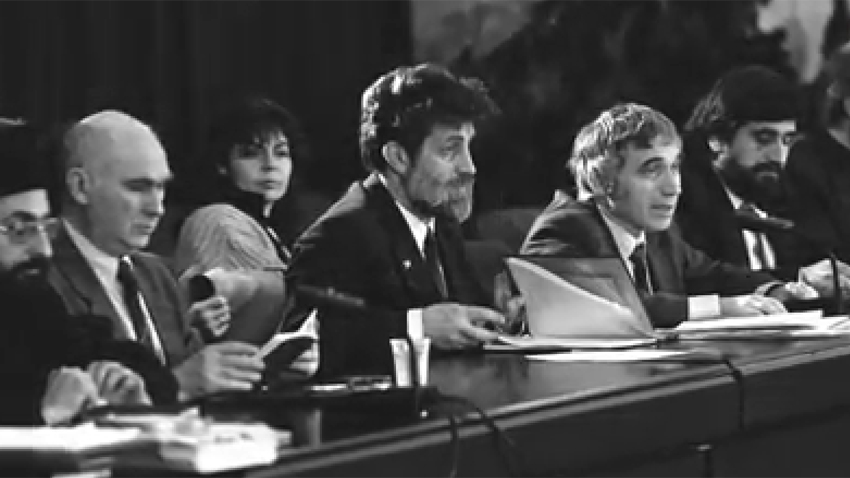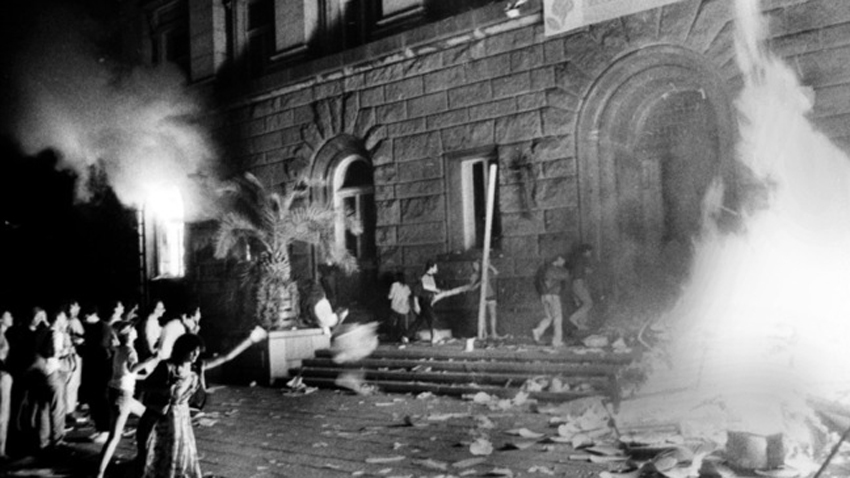The beginning of the 1990’s was a time of faith, hope and love. However, there was a lack of wisdom, Petko Kovachev, who was back then a member of the Independent Students’ Association and Ecoglastnost, said. 1990 was marked by a series of significant events: the State Council was dissolved, the country went bankrupt, three cabinets were in charge of the country’s government within one year only and the People’s Republic of Bulgaria was renamed to Republic of Bulgaria.
Despite the ongoing events, the Bulgarian transition period was peaceful. It was negotiated on the so-called National Round Table. The opposition proposed political consultations back in November 1989. Initially, the ruling party refused to hold talks. However, it changed its stand after the meeting held on December 14, the political strike initiated by Podkrepa Labor Union and the political events in neighboring Romania. Between January 3 and May 15, 1990, the National Round Table held 19 sittings. The consultations were broadcast live on the airwaves of the Bulgarian National Radio.
 Here is what former Chairman of the Bulgarian National Assembly Georgi Pirinski and President Zhelyu Zhelev said at the opening of the Round Table.
Here is what former Chairman of the Bulgarian National Assembly Georgi Pirinski and President Zhelyu Zhelev said at the opening of the Round Table.
„The historical mission of the National Round Table is to reach concrete agreements, so that we can solve the most-important political, social and economic problems of this country. These problems regard the abolishment of the totalitarian structures that were completely rejected by the society, the establishment of democratic foundations, of the main principles and draft bills, which secure quick and resolute steps towards the fulfillment of our national goals. The exceptional role of the National Round Table can be fulfilled through mutual agreement, constructive dialogue and responsibility only”, Georgi Pirinski said.
 „We took a second look at the text developed by the contact group and we found out that it was not categorical enough. We believe that the statute and the power of the Round Table had to be written in at least one paragraph of this document.”
„We took a second look at the text developed by the contact group and we found out that it was not categorical enough. We believe that the statute and the power of the Round Table had to be written in at least one paragraph of this document.”
The National Round Table focused on the political framework of the changes and hardly discussed any economic reforms and change of property.
The main achievements of the Bulgarian Round Table regarded the abrogation of Article 1 of the Bulgarian Constitution regarding the leading role of the Bulgarian Communist Party, the introduction of the Presidential Institution, the removal of the political influence over the Bulgarian army, police, court and diplomacy. Thus, the Grand National Assembly was set and the Sixth Department of Bulgaria’s State Security was closed. On March 12, 1990, three agreements were signed at the National Round Table-they regarded the role and the statute of the round table, the political system and the peaceful development of the transition period.
The Union of the Democratic Forces (SDS) gathered over 1 million people at the election meeting on June 7, 1990 at the Eagle’s Bridge in Sofia. Their followers were driven by the hope that the changes in Bulgaria would bring better life. On June 10, 1990, the first free elections were held in Bulgaria. The Bulgarian Socialist Party won the elections and took 211 seats out of all 400 seats at the Grand National Assembly. The Union of Democratic Forces, however, contended that the results of the elections were manipulated and initiated massive street protests. On July 4 the protesters urged the Bulgarian Socialist Party to acknowledge the falsification of the election results, to declare in public its possessions and initiate a trial against former Communist leader Todor Zhivkov.
 On July 6, protesters occupied the National Assembly and forced President Petar Mladenov to hand in his resignation, who spoke out the words on December 14, 1989 “The best thing to do is to bring the tanks in”. In the summer of 1990, the National Assembly decided to dismantle the symbols of the communist regime. The Bulgarian Socialist Party agreed to remove the pentacle on top of the Central Committee Building, but later refused to do it on purpose. On August 26, 1990, during one of the protests, the building of the Central Committee was set ablaze and the protesters from the City of Truth tent camp were accused of perpetrating this criminal act. Later, the Bulgarian Police broke-up their camp, although the truth about this event was quite different. The film entitled Void by Prescription created by Bulgarian film-director Malina Petrova, made it clear that the Building of the Central Committee was set on fire deliberately by those who intended to discredit the City of Truth protesting group. It is still a mystery whether the documents kept at this building burnt in the flames, or were taken out of the building in advance and hidden from the Bulgarian society. One thing is for sure, nobody knows what was written in those documents, which would probably reveal information about the ones who ruled this country before 1989. In this atmosphere the Bulgarian Grand National Assembly wrote and adopted the new Bulgarian Constitution, despite the protests held on July 12, 1991.
On July 6, protesters occupied the National Assembly and forced President Petar Mladenov to hand in his resignation, who spoke out the words on December 14, 1989 “The best thing to do is to bring the tanks in”. In the summer of 1990, the National Assembly decided to dismantle the symbols of the communist regime. The Bulgarian Socialist Party agreed to remove the pentacle on top of the Central Committee Building, but later refused to do it on purpose. On August 26, 1990, during one of the protests, the building of the Central Committee was set ablaze and the protesters from the City of Truth tent camp were accused of perpetrating this criminal act. Later, the Bulgarian Police broke-up their camp, although the truth about this event was quite different. The film entitled Void by Prescription created by Bulgarian film-director Malina Petrova, made it clear that the Building of the Central Committee was set on fire deliberately by those who intended to discredit the City of Truth protesting group. It is still a mystery whether the documents kept at this building burnt in the flames, or were taken out of the building in advance and hidden from the Bulgarian society. One thing is for sure, nobody knows what was written in those documents, which would probably reveal information about the ones who ruled this country before 1989. In this atmosphere the Bulgarian Grand National Assembly wrote and adopted the new Bulgarian Constitution, despite the protests held on July 12, 1991.
English version: Kostadin Atanasov
Photos: archive
On 25 January, 1935, Tsar Boris III signed the decree by force of which the Bulgarian National Radio was created. The man appointed head of broadcasting and first director of Radio Sofia, as it was then called, was Panayot Todorov..
“I am not at all fond of the word “legend”, I am a down-to-earth person and an artist. But if I would have to say something about it, it would be “I was recognized as the best basso cantabile in the world.” These words are from one..
2013 went down in the most modern history of Bulgaria as the year of protest. It was the protests that brought down the first GERB cabinet of PM Boyko Borissov, while the term of office of the bipartisan Bulgarian Socialist Party-Movement..

+359 2 9336 661
